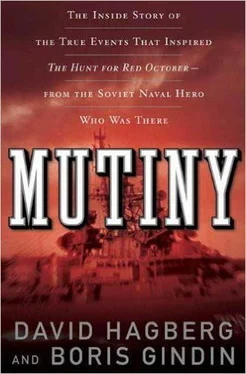They swore oaths to Lenin and to Communism, but it was nothing but a pack of lies from Stalin to Brezhnev.
When Sablin was still in school he wrote an angry letter to Premier Khrushchev. “Social inequalities,” Sablin argued, “are bastardizing the ideals of the Soviet state. Something must be done before it is too late.”
Moscow was not amused. A letter of reprimand was sent to Frunze, and Sablin’s graduation was put on hold, maybe permanently. The wisdom of the time was that the young man’s career was over before it had really begun.
But Sablin was a starry-eyed idealist, the class conscience. Despite the setback, he finished his studies and graduated with honors. Not long afterward Khrushchev was kicked out and Brezhnev took his place, with the goal of making the Soviet navy the best seagoing force on earth.
Within five years Sablin emerged from the ashes of his reprimand like a phoenix to be offered command of a destroyer. He was of a good military family, he was a Frunze graduate, he was a loyal, if overzealous, Communist who sometimes took the Party line to extremes, and he obviously was fearless.
But Sablin turned it down, opting instead to go to the Lenin Political Academy, where he could study doctrine so that he could truly understand Communism. Instead of commanding a ship in battle, he wanted to command a ship’s crew in grasping the ideals of Socialism.
It’s possible that even then, at the age of thirty, Sablin was already planning to make his mark by challenging Moscow.
But if he expected to find the answers at the academy he would be disappointed, because those kinds of explanations did not exist. He dived headfirst into Lenin and Marx and Engels in the original books and articles. He was trying to understand the October Revolution at the intellectual level. But like a Catholic priest who begins to doubt his faith and the reasons for his celibacy, Sablin was already starting to have trouble swallowing the doctrine. Wherever he looked he saw corruption, inequality, and the unearned privileges of the nomenklatura.
They fought the revolution to stop all that, to stop the class system, to give the working class the true power, but all that had gone by the wayside. A few old men in the Kremlin, not the people, were in charge.
When he tried to dig even deeper—after all, the revolution was perfection; it was simply his understanding that was faulty—he discovered that a lot of material was off-limits. For instance: Leon Trotsky had been one of the revolutionaries alongside Lenin, but his books and articles were not available. Not even to academy students, who were supposed to be the crème de la crème of Communist youth. The guys who were supposed to go out into the service and, like pastors, guide their flocks. It was as if seminary students were not allowed to speak about the Devil.
Despite the censorship, despite the disappointments, Sablin graduated and went out into the fleet a dedicated Communist who wholeheartedly believed in the philosophy, if not in the bureaucracy.
In a capitalist world the ordinary workers had to accept the fact that there would be rich people and there would be poor people. It was a natural outcome of such a system, and like it or not, the proletariat had to live with the consequences. But in Socialism there weren’t supposed to be such inequalities. Communism was designed to be the purest form of civilization. In theory.
In practice even the most casual observer could see that reality in the Soviet Union didn’t come anywhere close to the ideal.
The men who ran the nation from Moscow would never voluntarily give up their power. There would be no elections. The new revolution had to come from within. This time a zampolit would have to provide the spark.
Sablin’s favorite theme in his political lectures was revolution. Especially the October Revolution and the mutiny aboard the Potemkin.
In fact, it’s the zampolit’s position that revolution is a fine navy tradition that shouldn’t be discontinued.
“Before you make your choice, there is something more I have to tell you,” Sablin says.
He has the absolute attention of every officer and midshipman in the dining hall.
“I and the officers and men with me will take the Storozhevoy’s mooring lines in and leave in the morning for Kronshtadt.” It’s in the Gulf of Finland just twenty kilometers from Leningrad. “I will declare that this ship is a military base all by itself, and I will demand that Moscow give us access to radio and television so that I can personally speak to the people of the Soviet Union.”
This is even worse than treason. It’s outright insanity. Sablin means to get them all killed.
“How can you even suggest such a thing to us?” Sadakov shouted angrily. “You’re our political officer. You’re a good Communist. You’re supposed to set an example.”
We didn’t jump up and get out of there, Gindin remembers. None of us stormed to the front of the room to take our zampolit, who obviously was a criminal, into custody. “All of us officers were trained in military academies where we were taught to follow orders no matter what. Sablin outranked us, and it was mandatory to obey him. It was our legal and moral duty.”
The Russians say that all the brave men are in prison. You’re the boss, and I’m the dummy.
Someone gets up, walks to the table, and drops one of the backgammon pieces into the basket. Gindin can’t remember who was the first, nor could he see which piece the officer chose, but they are voting now.
The silence in the dining hall is thick. It’s like they are attending a funeral. Their own.
Gindin gets to his feet and walks up to the table. He stops for a second to look Sablin in the eye. The zampolit is fairly glowing with excitement. This is real history in the making. There will be movies and books and maybe even songs about this mutiny. It’ll be just like the Potemkin.
Gindin slowly holds his hand out. As he turns it over he opens his fist and a black backgammon piece falls into the basket. But it’s in slow motion. It’s as if the laws of gravity have been erased at that instant. Time is all but standing still.
The black backgammon piece turns end over end, falling, it seems, forever from an impossible height.
Gindin looks up again into Sablin’s eyes. The zampolit’s excitement fades like the smile from the lips of a jilted lover.
“Boris,” he says sadly.
In Moscow the Kremlin is all but deserted. Brezhnev and most of the Party’s leadership are at home, enjoying the day after the holiday, with perhaps a vodka or two, maybe some sweet Russian champagne. It is a time for families. They think that they’ll be back at their desks in the morning. But they’ll be back a lot sooner than that, and for a reason not one of them can possibly imagine at this moment.
PART 4
THE MUTINY OF FFG STOROZHEVOY

Leadership aboard a Soviet warship, aboard any warship, is from the top down. Obviously. But what’s not quite so obvious is that if the captain of a warship is suddenly removed like Bligh aboard the Bounty, the absolute authority devolves to the next in command, or whoever deposed the captain.
The big rub is that the other officers and crew have served under the captain and not the first officer or, in the case of the mutiny aboard the Storozhevoy, the zampolit.
Captains are to be obeyed instantly and without question. It has been a law in every navy the world over for the entire history of men at sea. And for good reason. It is only the captain who has been trained to command his ship. It is only the captain who has earned the trust and respect of his men by taking them to sea and bringing them home alive. It is only the captain who has the absolute authority of life and death over every man aboard. The starpom is only in training for the job, and the zampolit is nothing more than the Party hack.
Читать дальше













